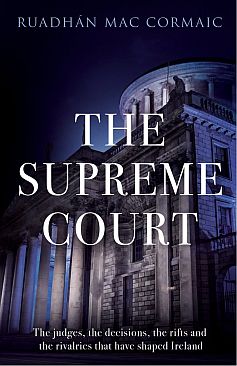Book Review Ruadhán Mac Cormaic – The Supreme Court
By Yi Li Alyssa Tjioe
Published on June 27, 2017

This book opens to a flurry of activity and confusion; within the first few lines, readers are introduced to the immediate, chaotic effects of an unexpected Supreme Court judgment. Mac Cormaic’s journalistic experience combines drama with sharp legal insight in an engaging treatise on the Irish Supreme Court’s development, making this unfamiliar subject accessible to a wide audience.
Mac Cormaic treats two themes: the cloak of mystery surrounding the Supreme Court and the tension between the judiciary and the legislative. Via interviews with judges, legal practitioners, litigants and academics Mac Cormaic contextualises the circumstances in which cases are determined for the audience. These insider views, supplemented by research and examination of the relationships between barristers and judges, provide an interesting take on the Supreme Court’s decision-making. Mac Cormaic then examines the political tensions between the Supreme Court and the Oireachtas (Irish Parliament), referring to the individual judges and how they affect the rulings and judicial view of the time. While dramatised somewhat, they are grounded in previously unpublished correspondence between Walsh and William Brennan of the US Supreme Court.
Considering the themes that are considered in this book and the difficulty of addressing the Supreme Court, its value lies in accessibility. Mac Cormaic’s understanding of the cases and skill in telling stories enlivens cases like the landmark McGee case. This challenged the ban on importing contraceptives before the Supreme Court in 1973, and is a significant constitutional law case, having ‘read’ rights into the text of the Constitution. Mac Cormaic’s interviews with McGee in this chapter intertwine the historical signs of a changing society and a growing women’s movement with the personal pride that McGee had in challenging the Supreme Court over the unfairness arising from State interference into marital privacy. In response to the High Court hearing (which dismissed her case by concluding that there was no such type of personal right to self-regulation of marriage) McGee said “I was disgusted… I didn’t believe it. ‘OK’, I said, ‘what can I do now?’”
Mac Cormaic then considers the selection of lawyers and judges, the experience of the McGees in the witness box and the circumstances and cases referenced in the judgment. By negotiating the turbulence involved in making a judgment and rationally explaining the views of the judges, the historical context in which those views developed and including the appellant’s own views, Mac Cormaic demonstrates the fervour with which arguments are crafted by lawyers and the pressures and personal judicial characters’ views which lay judgments. Additionally, by including the view of the people challenging the Court in landmark cases such as McGee, Mac Cormaic illustrates disparity between theory and practice as judges walk the tightrope between upholding policy and justice in individual cases.
The chapter on McGee is succeeded by an examination of how that decision then affected the legislators’ choice in composition of the Supreme Court judges. When the dissenting Chief Justice Billy FitzGerald died, Tom O’Higgins was the replacement; a controversial choice with close links to the government and, at the time, the most junior High Court judge. Mac Cormaic delves into the reasons for the choice of O’Higgins, the tension among the judges as a result and how his tenure came to affect Supreme Court decisions. He concludes that it was a successful tenure whereby fundamental rights were upheld over State actions, albeit with limits; notably in relation to LGBT plus rights.
Overall, Mac Cormaic supplies a fascinating account of the Irish Supreme Court which will be relished by anyone aficionado of law, history and politics. Mac Cormaic makes a challenging topic accessible to those lacking a legal background or grasp of the Irish legal system through his clear,logical presentation, complemented by excellent depictions of the time.
The Author

Yi Li Alyssa Tjioe is an Associate Editor with the international law magazine, The New Jurist. An undergraduate at the University of Leeds, Alyssa is an aspiring lawyer. She is currently interested in researching arbitration law, international trade law, and environment sustainability.


